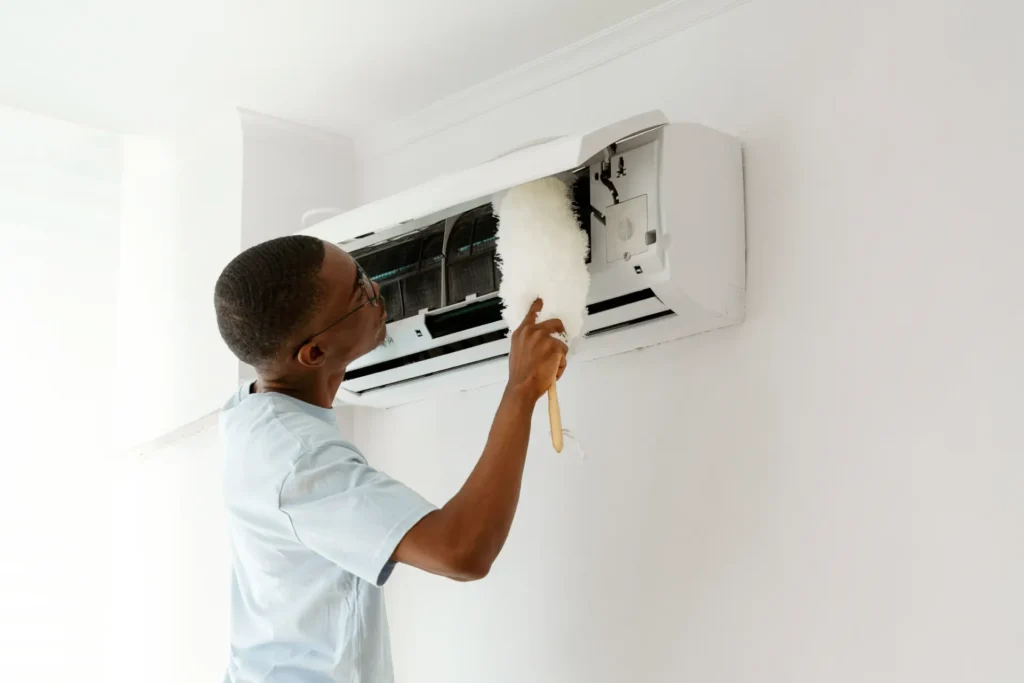Your air conditioning system plays a vital role in keeping your home cool and comfortable, especially during Australia’s hot summer months. However, like any other appliance, air conditioners are prone to common issues that can affect their performance and efficiency. Understanding these problems and how to prevent them can save you from costly repairs and keep your system running smoothly.
In this blog, we’ll go over the most common air conditioning issues homeowners face and provide tips on how to avoid them.
1. Refrigerant Leaks
Refrigerant is the lifeblood of your air conditioning system, responsible for cooling the air that circulates through your home. If your system is low on refrigerant, it either wasn’t properly charged during installation, or it has developed a leak. This can cause the system to underperform and even lead to more serious damage over time.
- The air isn’t as cool as it used to be.
- Ice forms on the evaporator coil.
- Hissing or bubbling noises from the unit.
How to Avoid It:
Refrigerant leaks are best handled by a professional technician. Regular maintenance and inspections can help detect leaks early and prevent further damage. If you suspect a leak, it’s important to schedule a service call as soon as possible to avoid more expensive repairs.
2. Clogged or Dirty Filters
Clogged air filters are one of the most common issues with air conditioners. When filters get dirty, airflow is restricted, causing the system to work harder to cool your home. This not only reduces efficiency but can also lead to other problems, such as frozen evaporator coils and increased wear on the system.
Symptoms of a Clogged Filter:
- Reduced airflow from the vents.
- The system runs longer than usual.
- Higher energy bills.
How to Avoid It:
Check and replace air filters regularly—about once a month during peak cooling seasons. If you have pets or live in a dusty area, you may need to change them more often. Clean filters improve airflow and keep your system running efficiently.
3. Frozen Evaporator Coils
The evaporator coils in your air conditioner absorb heat from the air inside your home. When they freeze over, it prevents the system from cooling properly. This issue is often caused by restricted airflow, low refrigerant levels, or dirty coils.
Symptoms of Frozen Coils:
- Insufficient cooling.
- Ice visible on the outdoor unit or evaporator coil.
- The system frequently cycles on and off.
How to Avoid It:
Ensure your air filters are clean and airflow is not restricted. If you notice ice on the coils, turn off the system and let it thaw. Then, contact a technician to check for underlying issues, such as low refrigerant or airflow problems.
4. Thermostat Malfunctions
Thermostat issues are another common problem that can affect the performance of your air conditioner. If your thermostat is not calibrated correctly or is malfunctioning, it won’t be able to accurately regulate the temperature in your home.
Symptoms of a Faulty Thermostat:
- The air conditioner doesn’t turn on.
- The system runs longer than necessary.
- The temperature in the room doesn’t match the thermostat setting.
How to Avoid It:
Make sure your thermostat is properly calibrated and located in a suitable spot—away from direct sunlight or heat sources. If you’re still experiencing issues, consider upgrading to a smart thermostat that can provide more precise control over your system.
5. Drainage Problems
Air conditioners remove moisture from the air, which is then drained through a pipe. If the drain line becomes clogged, it can lead to water leaks and damage to your system or your home. Excess moisture can also cause humidity levels to rise, making your home feel less comfortable.
Symptoms of Drainage Issues:
- Water pooling around the indoor unit.
- The system shuts off unexpectedly.
- Increased humidity indoors.
How to Avoid It:
Regularly check the drain line for clogs and clear any obstructions. Make sure the line is properly connected and draining away from your home. If you’re unsure, a professional technician can inspect and clean the line during regular maintenance.
6. Electrical Control Failure
Frequent on-and-off cycling of your air conditioner can wear out electrical components like compressors and fans. This often happens when the system is too large for the space it’s cooling, leading to unnecessary strain on these parts.
Symptoms of Electrical Issues:
- The system frequently turns on and off.
- The air conditioner doesn’t respond when turned on.
- A burning smell or sparking.
How to Avoid It:
Ensure your air conditioner is appropriately sized for your home. Schedule regular maintenance to inspect electrical connections, capacitors, and other key components to prevent issues before they cause a breakdown.
Conclusion
By understanding these common air conditioning issues and taking steps to prevent them, you can keep your system running efficiently and avoid costly repairs. Regular maintenance, proper airflow, and timely repairs are key to ensuring your air conditioner performs at its best.
For professional maintenance, repairs, or advice on keeping your system in top shape, contact Northend Air Conditioning. Our team is here to help with all your air conditioning needs.
